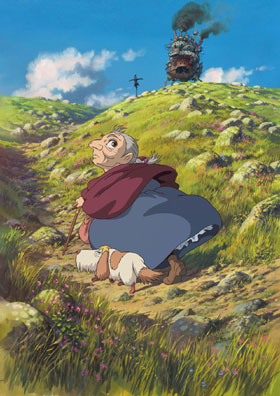| |
|
review | awards | availability | |

Notes:
• As is usual for a Disney-Ghibli collaboration,
the English dub track is remarkably good, and features
effective voice acting from actors like Christian
Bale, Lauren Bacall and Billy Crystal. Also, the
screenplay is a bit more explanatory and fleshed out
than the Japanese subtitles, making a viewing of the
English dub exceptionally worthwhile.
Awards:
2005 Mainichi Film Concours
• Winner - Reader's Choice Award for Best Film
2004 Venice
Film Festival
• Winner - Golden Osella
• Nomination - Golden Lion
2004 Catalonian Int'l Film Festival
• Winner - Audience Award
• Nomination - Best Film
Availability:
DVD (Japan)
Region 2 NTSC
Buena Vista Home Video
2-DVD Set
16x9 Anamorphic Widescreen
Japanese, English, French Language Tracks
Dolby Digital 5.1
Removable English, French, Japanese Subtitles
Various Extras
*Also Available on Blu-ray Disc

|
|
|
Review
by Kozo: |
Hayao Miyazaki adds
to his peerless filmography with the rich and moving
fantasy Howl's Moving Castle. Based on a novel
by British author Diana Wynne Jones, the film takes
place in a fictional pseudo-European world where magic
exists. Sophie (voiced by Chieko Baisho) is a stubborn,
but unconfident young woman who's resigned to running
the family business, a hat shop left to her by her
father. She also grouses about how she's not beautiful,
and seems uninterested in changing her life. Enter
Howl (voiced by *gasp* Takuya Kimura of SMAP), a rogue
wizard who accidentally drags Sophie into his world.
After a chance meeting with Howl, Sophie is immediately
smitten, but she incurs the wrath of the Witch of
the Waste, a notorious sorceress who's after Howl's
heart.
Thanks to a curse from the
Witch, Sophie is transformed into a 90 year-old woman,
and is soon on her own, trekking into the mountainous
region known as the Wastes in order to find a cure.
She ends up finding Howl's moving castle, a magically-mobile
home powered by a kept fire demon named Calcifer.
Immediately, Sophie ingratiates herself into the lives
of Calcifer, Howl's young apprentice Markl, and finally
Howl himself. She becomes the castle's self-appointed
cleaning woman, and slowly comes to learn about Howl,
his conflict with the Witch of the Waste, and his
rift with the King's sorceress Suliman. Sophie also
comes to learn about herself, and through her care
of the castle and its inhabitants, begins to free
herself of her self-imposed limits, and perhaps even
her curse. But will her newfound strength be enough
to save Howl?
For an animated film,
Howl's Moving Castle is immediately impressive.
The world Miyazaki creates is rich and detailed, and
is perfectly complemented by the score from usual
Miyazaki composer Joe Hisaishi. The animation is detailed
and expressive, and full of the clever little touches
and nuances that Miyazaki and Studio Ghibli are known
for. Sophie starts as an unconfident character, but
through her journey grows into a typical headstrong
Ghibli heroine. The supporting characters are endearingly
portrayed, from the irreverent fire demon Calcifer,
to the mute scarecrow Turnip-Head, to even the corpulent
Witch of the Waste. As usual, Miyazaki invites the
viewer into his world on his terms, never pausing
to really explain anything. That's fine, though; Miyazaki
ultimately reveals enough about his characters and
situations to get them to matter to the audience.
Still, Howl's Moving Castle feels less successful than Miyazaki's previous works,
namely Princess Mononoke and Spirited Away,
two films that can easily be called masterpieces of
the art form. Like those two films, there are no real
bad guys in Howl's Moving Castle; instead,
the characters face larger concepts like war, politics,
the destruction of nature, and an individual's personal
growth. Miyazaki's characters are alternately greedy,
selfish, noble, and heroic, and their actions define
them more than any narrative explanations ever could.
But Miyazaki doesn't entirely succeed at integrating
his characters into the film's larger conflicts. There's
a war going on in the film, and Howl is decidedly
against it, but his decisions and deeds seem remote
from the film's main drama, and subsequently removed
from the audience too. Howl is also underdeveloped;
he's certainly a charismatic figure, and his vanity
and self-abandon ultimately prove compelling. But
when the most important drama occurs he's usually
somewhere else.
Still, the main character
is not Howl but Sophie, and Miyazaki traces her personal
journey and growth with obvious affection. Miyazaki
tends to favor heroines over heroes in his films,
and Howl's Moving Castle is no exception. The
film itself feels less successful than Miyazaki's
previous works because its various messages don't
seem to cohere into a single, compelling whole. But
it doesn't really matter, does it? Despite not being
a perfect Miyazaki movie, Howl's Moving Castle is still head-and-shoulders above 95% of the dreck
that passes for animated AND live action filmmaking
nowadays. As a storyteller working in animation, Miyazaki
is still without peer, and Howl's Moving Castle is yet another Miyazaki-guided journey into an enchanting
and wonderfully imaginative world. (Kozo 2005)
|
|